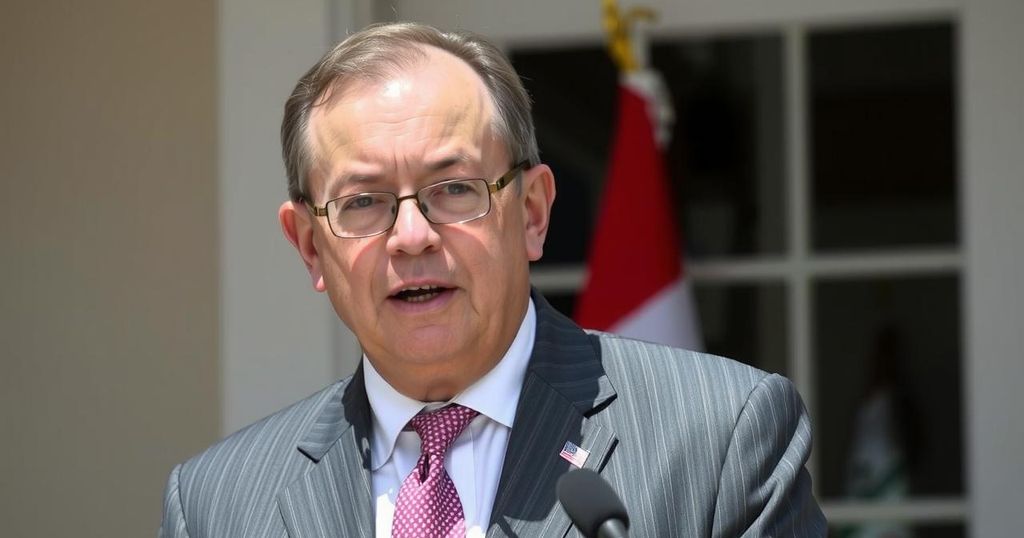U.S. envoy Amos Hochstein visits Beirut amid concerns over a fragile ceasefire between Israel and Hezbollah, coinciding with impending Lebanese presidential elections scheduled for January 9. The envoy aims to propose a 60-day ceasefire extension to facilitate implementation and troop withdrawals. Joseph Aoun emerges as a leading candidate for presidency, with Hezbollah expressing tacit support for his candidacy.
On January 6, 2025, U.S. special envoy Amos Hochstein arrived in Beirut, Lebanon, amidst rising tensions surrounding the delicate ceasefire between Israel and Hezbollah. His visit follows critical developments in the region, including a scheduled Lebanese presidential election on January 9 and a looming deadline for Israeli troop withdrawal from southern Lebanon as mandated by a ceasefire agreement.
The ceasefire not only stipulates an Israeli withdrawal to support stability but also calls for Hezbollah’s repositioning northward of the Litani River, allowing the Lebanese army and UN peacekeeping forces to monitor the area. Despite these agreements, the ceasefire remains precarious, with incidents such as Israeli airstrikes on Hezbollah positions and mortar attacks by Hezbollah reported in recent weeks.
During his visit, Hochstein intends to propose an extension of the ceasefire by an additional 60 days to allow for the effective implementation of its terms. This extension would be pivotal for maintaining peace and ensuring troop withdrawals before the official completion date of January 25, just prior to the inauguration of U.S. President-elect Donald Trump. Meanwhile, diplomatic activity intensifies in Lebanon as various international actors seek to resolve the nation’s prolonged presidential void.
The expected parliamentary vote for the presidency follows ongoing discussions among international and regional leaders, and Hochstein’s meetings in Saudi Arabia signify a coordinated effort to address political stalemates in Lebanon. The leading candidates for the presidency have garnered varying degrees of support, with Lebanese Army Chief Joseph Aoun appearing to be the leading contender, especially after Hezbollah indicated they would not veto his candidacy.
The situation remains fluid as high-stakes negotiations will not only impact the domestic political landscape of Lebanon but also the fragile ceasefire with Israel. As Hochstein’s mission unfolds, the immediate future of Lebanon’s governance and security continues to hang in the balance, reflecting the urgency of the geopolitical dynamics at play.
The intricate political landscape in Lebanon has been significantly affected by the prolonged absence of a president following the end of Hezbollah-backed President Michel Aoun’s term in October 2022. This political vacuum has coincided with intermittent conflict between Israel and Hezbollah, which has culminated in recent ceasefire agreements facilitated by international mediation. Those agreements establish terms for troop withdrawals and regional stability but are under constant strain due to ongoing military skirmishes. Following the ceasefire, the country is also preparing for presidential elections, amidst shifts in domestic power and diplomatic maneuvers from influential players in the region, including Saudi Arabia and the United States.
In summary, Amos Hochstein’s visit to Beirut comes at a crucial juncture for Lebanon, as the country prepares for a presidential election amidst a precarious ceasefire with Israel. With heightened diplomatic activity and the potential extension of the ceasefire, Lebanon’s political future hangs by a thread, with candidates like Joseph Aoun potentially reshaping its governance landscape. The ongoing implementation of the ceasefire and troop withdrawal remains essential to ensuring both security and political stability in Lebanon during this tumultuous period.
Original Source: www.al-monitor.com






